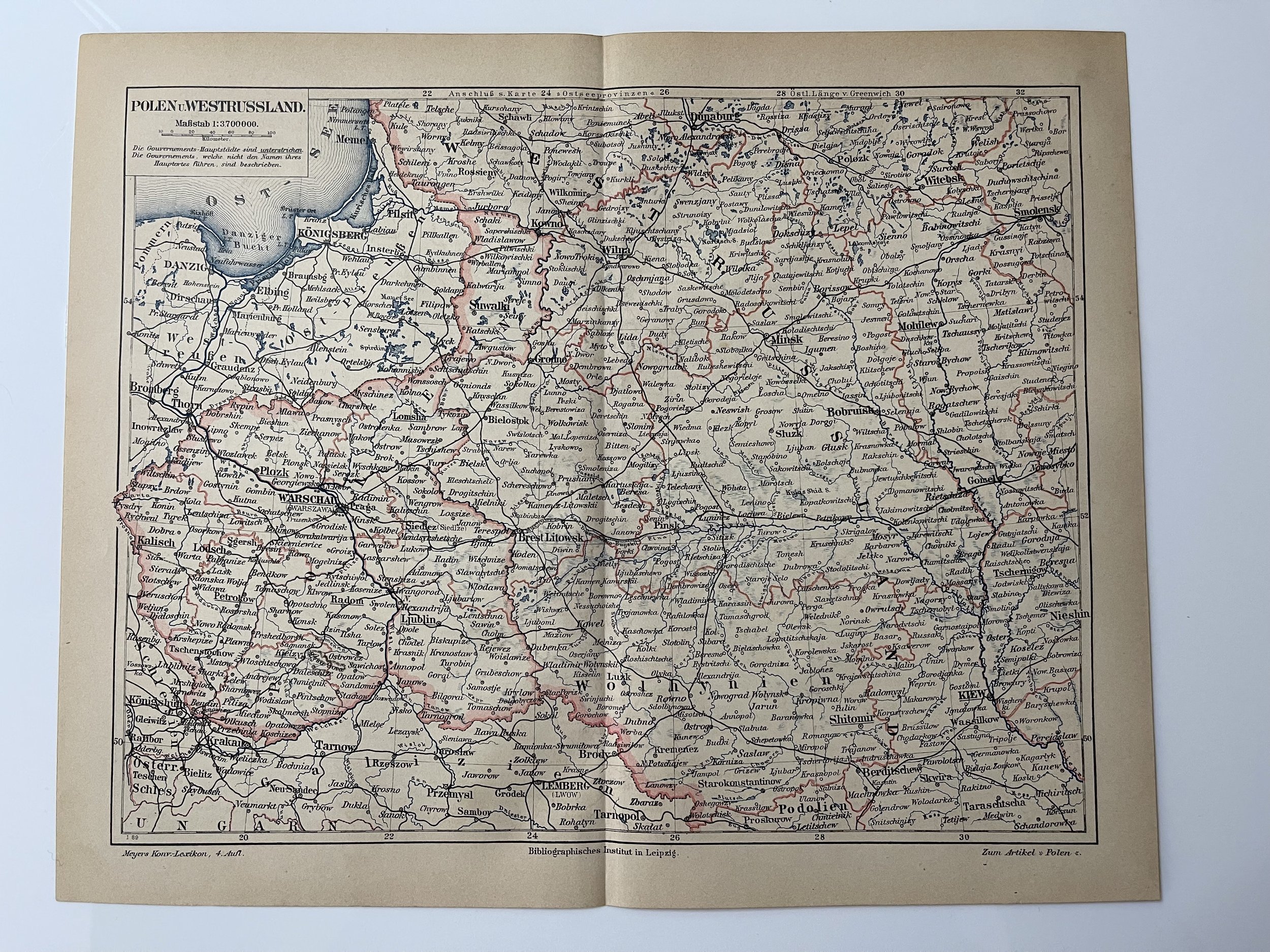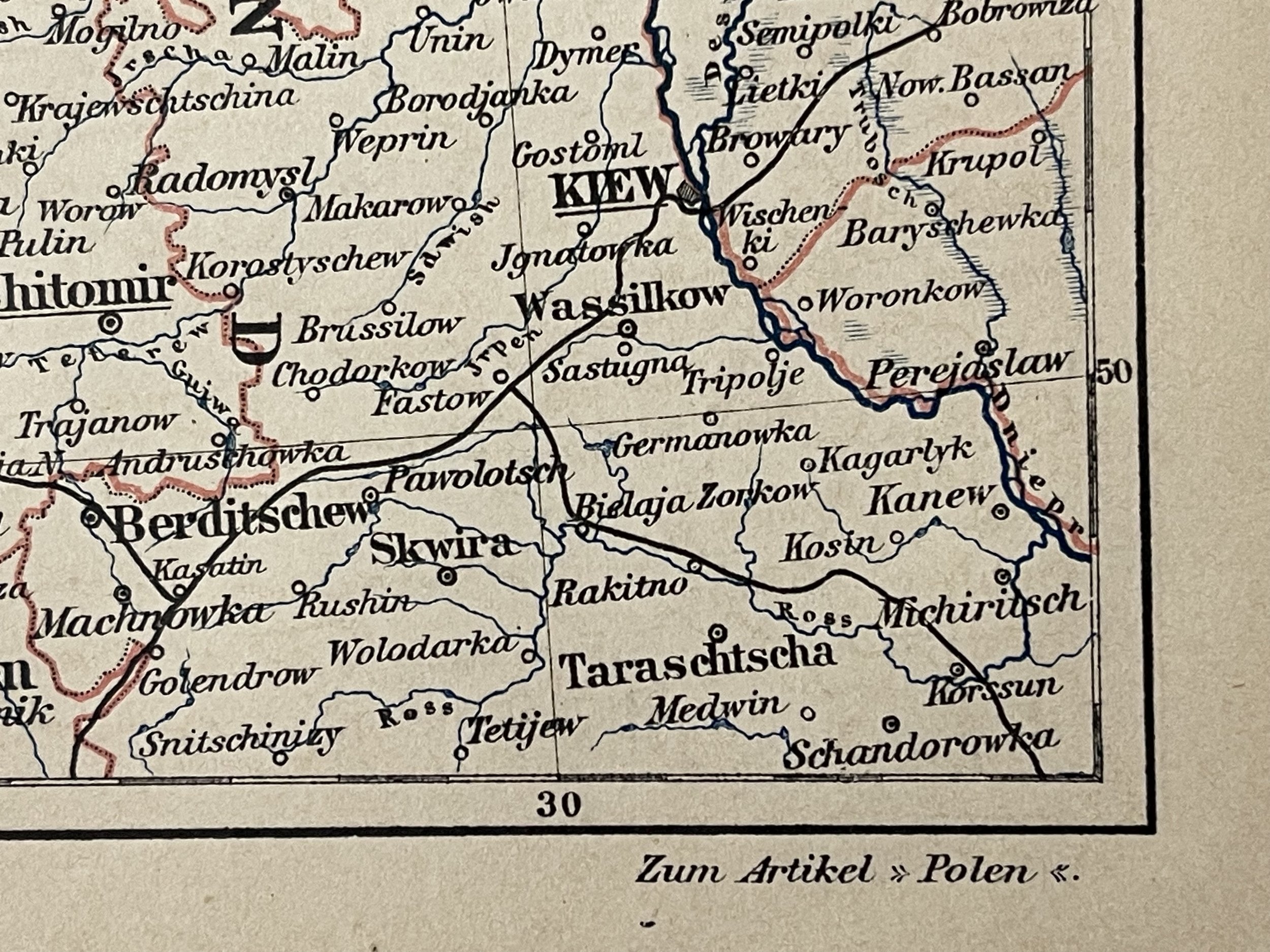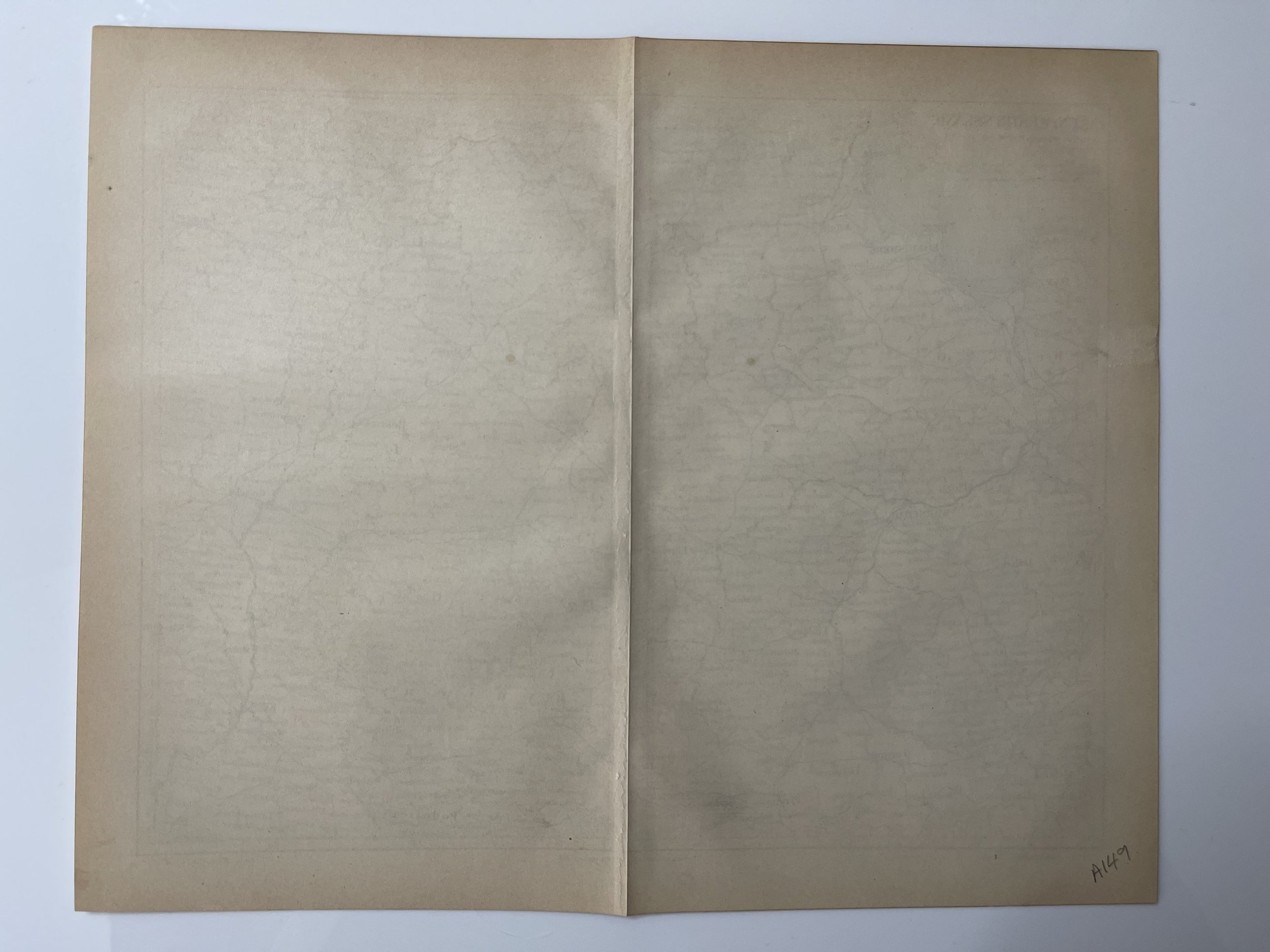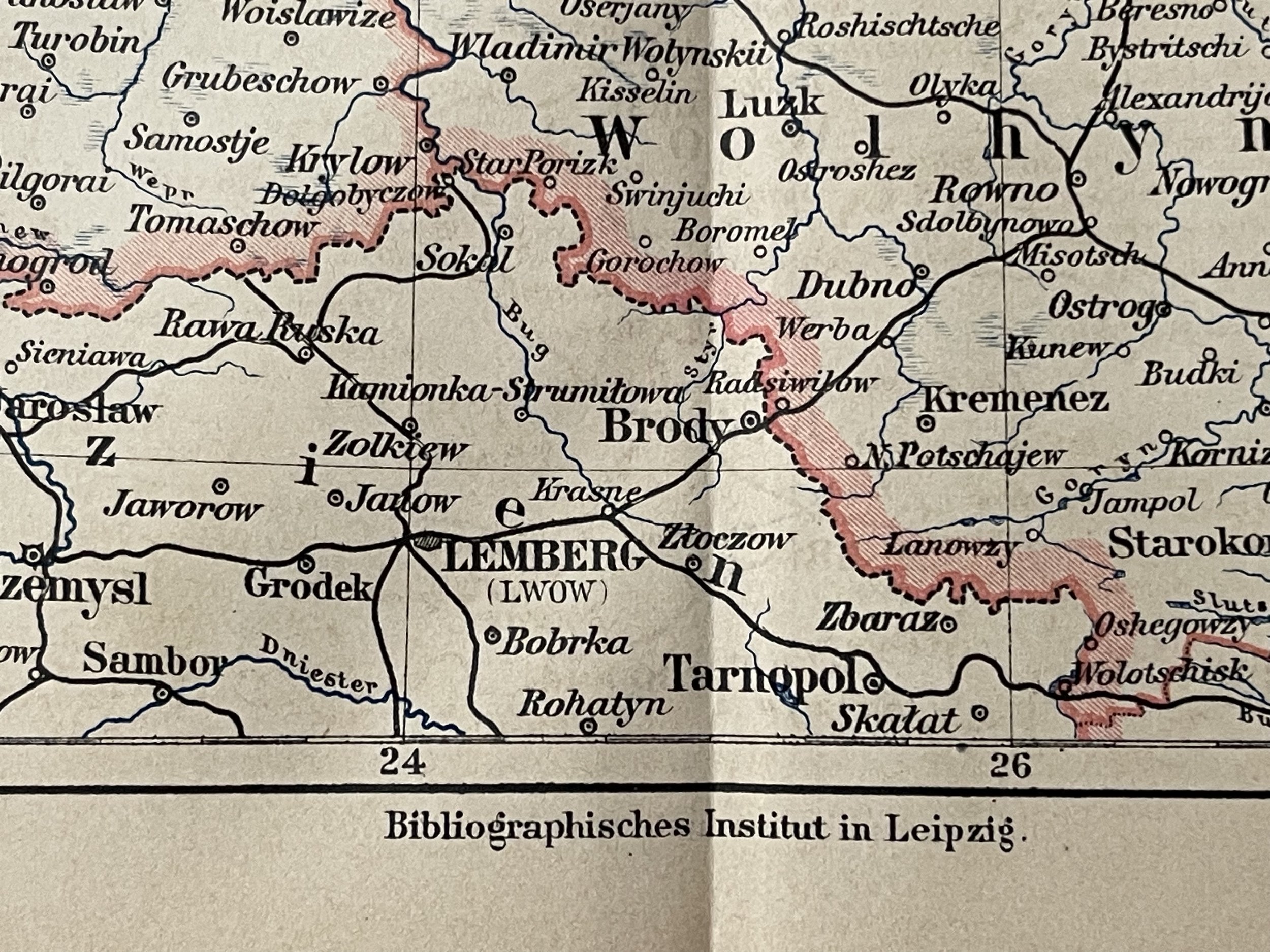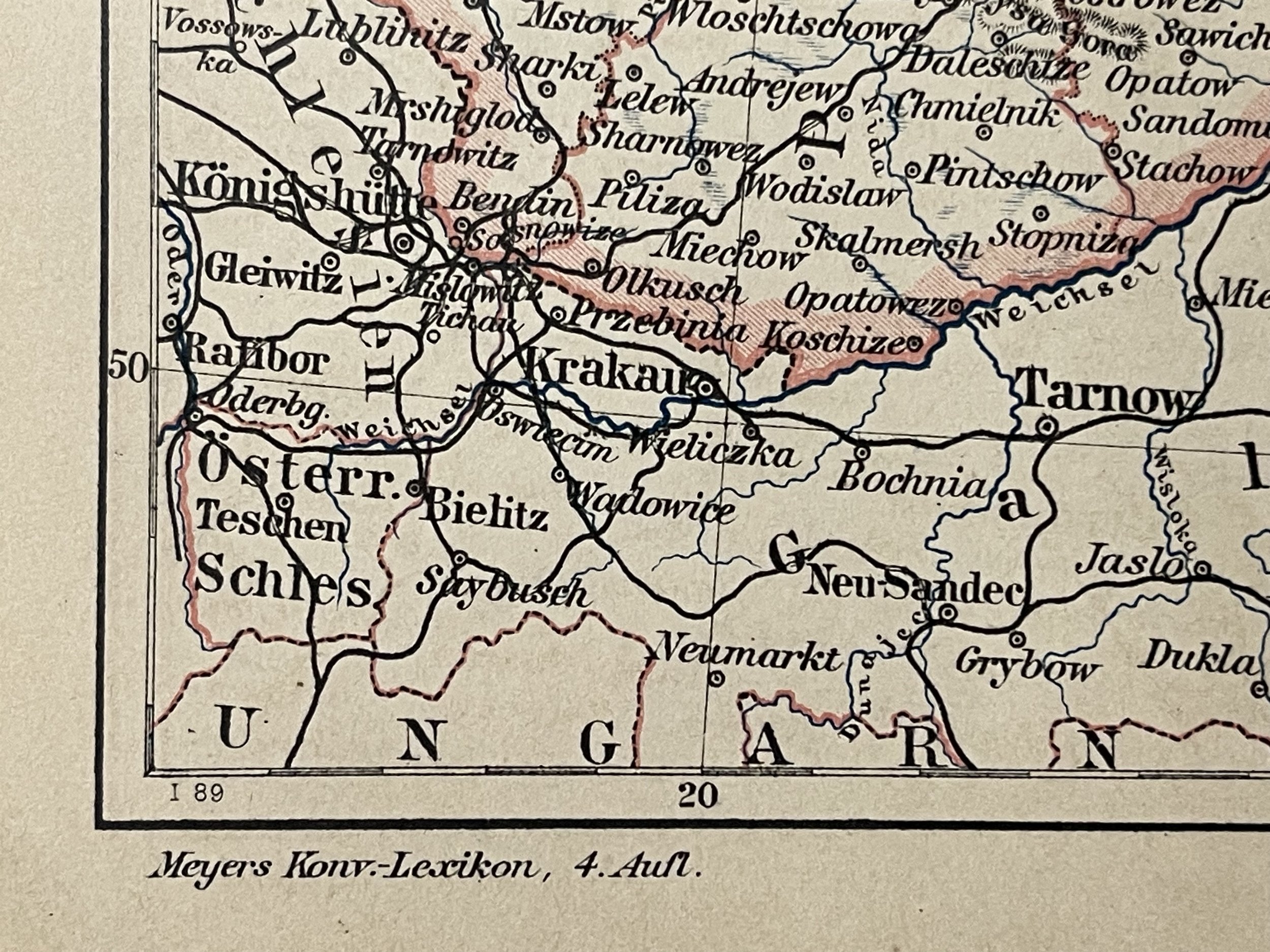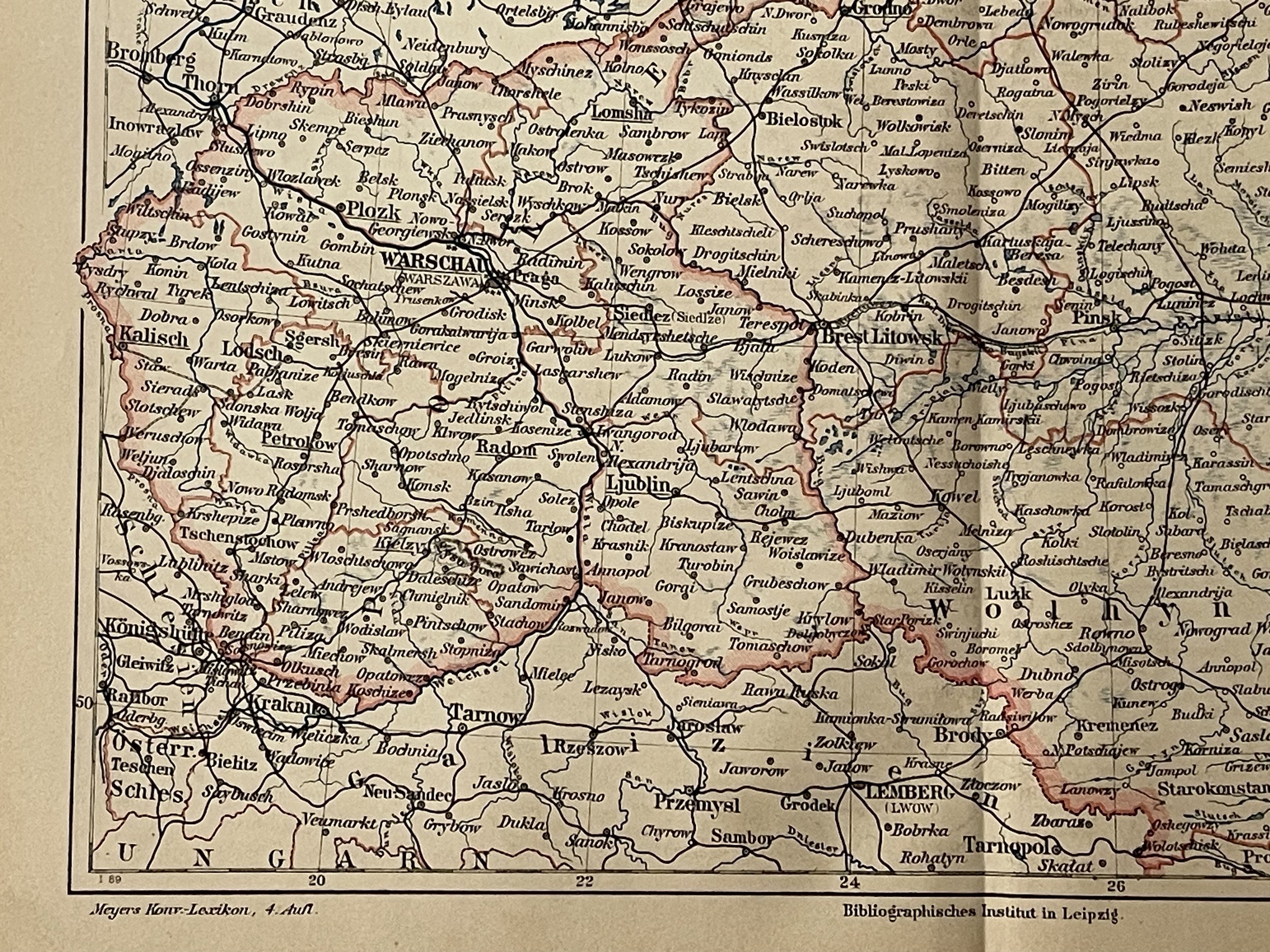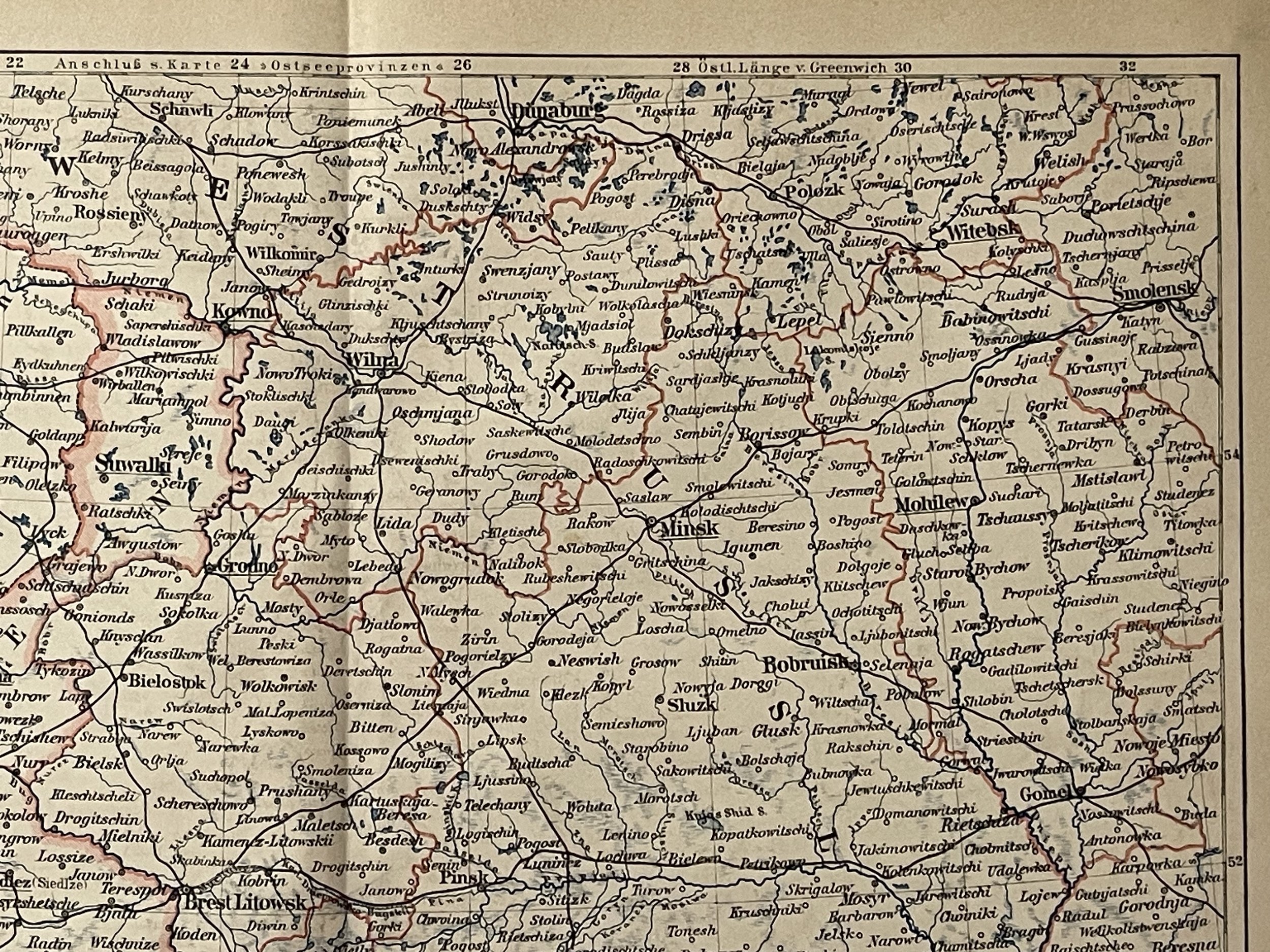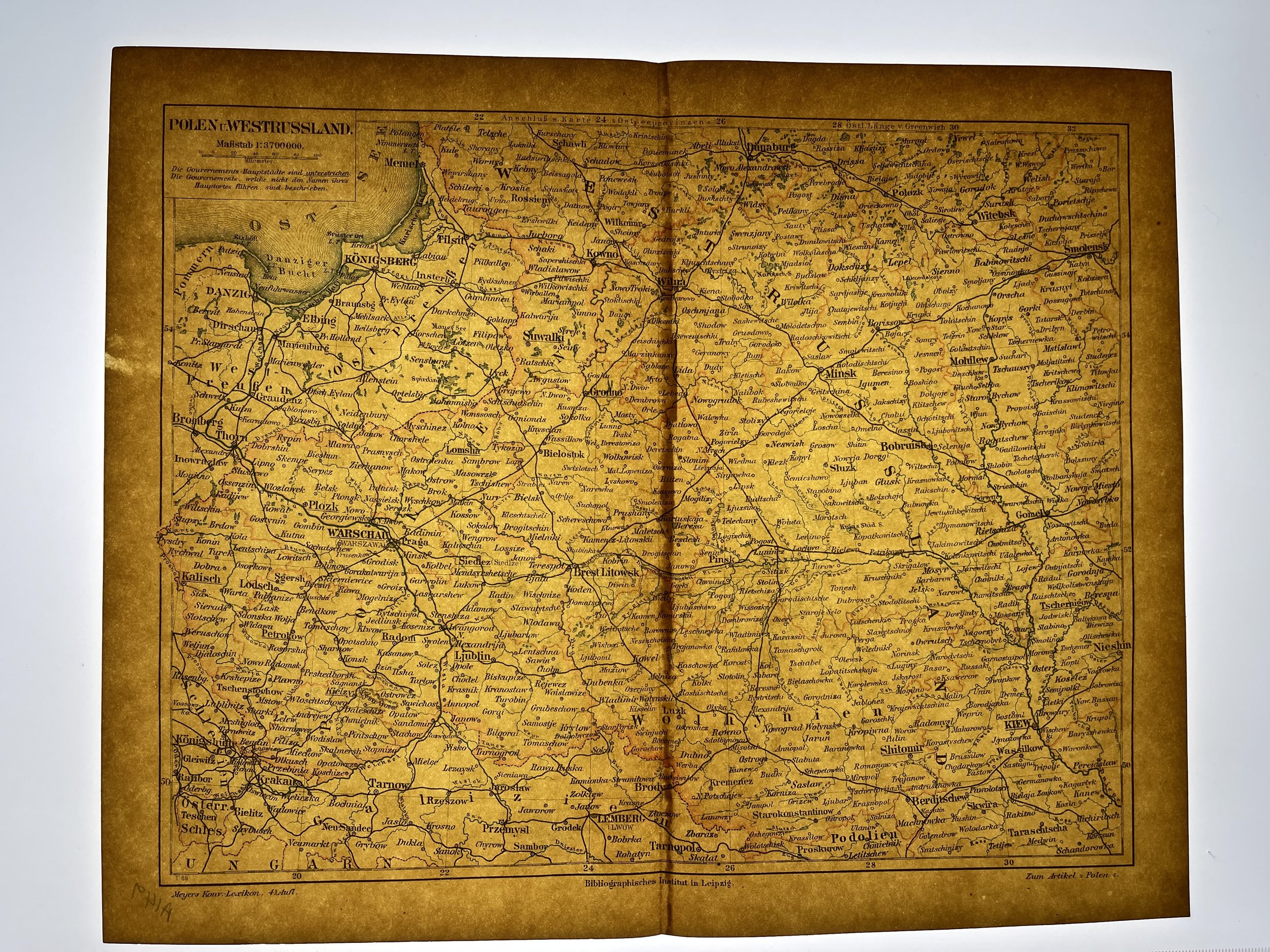Poland - Joseph Meyer - 1889
Lipsk was granted town rights in 1580 by King Stephen Báthory by virtue of a privilege issued in nearby Grodno. It was a royal town until the Third Partition of Poland when it was annexed by Prussia. In 1807 it was regained by Poles as part of the short-lived Duchy of Warsaw. In 1815 it became part of Congress Poland, later on forcibly integrated with Imperial Russia. As part of anti-Polish repressions after the January Uprising, Lipsk was deprived of town rights by the Russian administration in 1869. Under Russian rule, it was known as Лейпциг на Бебже. It was part of Poland again, after the country again regained independence in 1918.
Memorial stone to Marianna Biernacka in Lipsk
During World War II it was occupied by the Soviet Union from September 1939 to June 1941. Several Polish families were deported deep into the USSR, and the occupation administration was co-created by local Jews.[3] From June 1941 to July 1944 it was occupied by Nazi Germany. In 1941, the Germans deported 99 local Jews to the ghettos in Augustów and Grodno, from where they were later transported to the Treblinka extermination camp. On July 13, 1943, the Germans murdered 50 Poles from Lipsk in nearby Naumowicze. Among those killed was Marianna Biernacka, one of the 108 Martyrs of World War II. In July 1944, Lipsk was captured by the Red Army, and murders and robberies followed, as well as the fight against the Polish Home Army resistance movement.
1889 Bibliog. Inst. Leipzig: "POLEN U. The cover of the 4th edition of "Meyers Konversations-Lexicon," consisting of 16 volumes, appeared in 1885-90.
Joseph Meyer (9 May 1796 - 27 June 1856) was a German industrialist and publisher, most noted for his encyclopaedia, Meyers Konversations-Lexikon.
Meyer was born at Gotha, Germany, and was educated as a merchant in Frankfurt am Main. He went to London in 1816 but returned to Germany in 1820 after business adventures and stock speculations fell through. Here he invested in enterprises such as the textile trade (1820–24). Soon after the first steam-hauled railway had started in December 1835, Meyer started to make business plans to start the first railways. He also bought some concessions for iron mining. In 1845 he founded the Deutsche Eisenbahnschienen-Compagnie auf Actien (German Railway Rail joint stock company).
Meyer operated very successfully as a publisher, employing a system of serial subscription to publications, which was new at that time. To this end he founded a company, Bibliographisches Institut, in Gotha in 1826. It published several editions of the Bible, works of classical literature ("Miniatur-Bibliothek der deutschen Classiker", "Groschen-Bibliothek"), the world in pictures on steel engravings ("Meyers Universum", 1833–61, 17 volumes in 12 languages with 80,000 subscribers all over Europe), and an encyclopaedia, ("das Grosse Conversations-Lexikon für die gebildeten Stände"; see Meyers Konversations-Lexikon, 1839–55, 52 volumes). His company grew substantially, and in 1828 he moved it from Gotha to Hildburghausen, where he died thirty years later. He became involved in cartography, producing many atlases with steel-engraved maps printed from steel plates, including Meyer's Groẞer Hand-Atlas (1843-1860).
In 1830, inspired by news of the July Revolution in France, Meyer founded newspapers that promoted the liberal ideals of the revolutionaries. In 1848 he supported the revolutions that took place throughout Germany and much of Europe, and in 1849 was briefly imprisoned for his revolutionary activities. His publishing and other businesses prospered, and by 1910 his grandsons constituted the richest family in the Saxon territories, with more total wealth than the King of Saxony.
After Meyer's death in 1856, his son Herrmann Julius Meyer took over the Bibliographisches Institut, which was at that time struggling financially.
Lipsk was granted town rights in 1580 by King Stephen Báthory by virtue of a privilege issued in nearby Grodno. It was a royal town until the Third Partition of Poland when it was annexed by Prussia. In 1807 it was regained by Poles as part of the short-lived Duchy of Warsaw. In 1815 it became part of Congress Poland, later on forcibly integrated with Imperial Russia. As part of anti-Polish repressions after the January Uprising, Lipsk was deprived of town rights by the Russian administration in 1869. Under Russian rule, it was known as Лейпциг на Бебже. It was part of Poland again, after the country again regained independence in 1918.
Memorial stone to Marianna Biernacka in Lipsk
During World War II it was occupied by the Soviet Union from September 1939 to June 1941. Several Polish families were deported deep into the USSR, and the occupation administration was co-created by local Jews.[3] From June 1941 to July 1944 it was occupied by Nazi Germany. In 1941, the Germans deported 99 local Jews to the ghettos in Augustów and Grodno, from where they were later transported to the Treblinka extermination camp. On July 13, 1943, the Germans murdered 50 Poles from Lipsk in nearby Naumowicze. Among those killed was Marianna Biernacka, one of the 108 Martyrs of World War II. In July 1944, Lipsk was captured by the Red Army, and murders and robberies followed, as well as the fight against the Polish Home Army resistance movement.
1889 Bibliog. Inst. Leipzig: "POLEN U. The cover of the 4th edition of "Meyers Konversations-Lexicon," consisting of 16 volumes, appeared in 1885-90.
Joseph Meyer (9 May 1796 - 27 June 1856) was a German industrialist and publisher, most noted for his encyclopaedia, Meyers Konversations-Lexikon.
Meyer was born at Gotha, Germany, and was educated as a merchant in Frankfurt am Main. He went to London in 1816 but returned to Germany in 1820 after business adventures and stock speculations fell through. Here he invested in enterprises such as the textile trade (1820–24). Soon after the first steam-hauled railway had started in December 1835, Meyer started to make business plans to start the first railways. He also bought some concessions for iron mining. In 1845 he founded the Deutsche Eisenbahnschienen-Compagnie auf Actien (German Railway Rail joint stock company).
Meyer operated very successfully as a publisher, employing a system of serial subscription to publications, which was new at that time. To this end he founded a company, Bibliographisches Institut, in Gotha in 1826. It published several editions of the Bible, works of classical literature ("Miniatur-Bibliothek der deutschen Classiker", "Groschen-Bibliothek"), the world in pictures on steel engravings ("Meyers Universum", 1833–61, 17 volumes in 12 languages with 80,000 subscribers all over Europe), and an encyclopaedia, ("das Grosse Conversations-Lexikon für die gebildeten Stände"; see Meyers Konversations-Lexikon, 1839–55, 52 volumes). His company grew substantially, and in 1828 he moved it from Gotha to Hildburghausen, where he died thirty years later. He became involved in cartography, producing many atlases with steel-engraved maps printed from steel plates, including Meyer's Groẞer Hand-Atlas (1843-1860).
In 1830, inspired by news of the July Revolution in France, Meyer founded newspapers that promoted the liberal ideals of the revolutionaries. In 1848 he supported the revolutions that took place throughout Germany and much of Europe, and in 1849 was briefly imprisoned for his revolutionary activities. His publishing and other businesses prospered, and by 1910 his grandsons constituted the richest family in the Saxon territories, with more total wealth than the King of Saxony.
After Meyer's death in 1856, his son Herrmann Julius Meyer took over the Bibliographisches Institut, which was at that time struggling financially.
Lipsk was granted town rights in 1580 by King Stephen Báthory by virtue of a privilege issued in nearby Grodno. It was a royal town until the Third Partition of Poland when it was annexed by Prussia. In 1807 it was regained by Poles as part of the short-lived Duchy of Warsaw. In 1815 it became part of Congress Poland, later on forcibly integrated with Imperial Russia. As part of anti-Polish repressions after the January Uprising, Lipsk was deprived of town rights by the Russian administration in 1869. Under Russian rule, it was known as Лейпциг на Бебже. It was part of Poland again, after the country again regained independence in 1918.
Memorial stone to Marianna Biernacka in Lipsk
During World War II it was occupied by the Soviet Union from September 1939 to June 1941. Several Polish families were deported deep into the USSR, and the occupation administration was co-created by local Jews.[3] From June 1941 to July 1944 it was occupied by Nazi Germany. In 1941, the Germans deported 99 local Jews to the ghettos in Augustów and Grodno, from where they were later transported to the Treblinka extermination camp. On July 13, 1943, the Germans murdered 50 Poles from Lipsk in nearby Naumowicze. Among those killed was Marianna Biernacka, one of the 108 Martyrs of World War II. In July 1944, Lipsk was captured by the Red Army, and murders and robberies followed, as well as the fight against the Polish Home Army resistance movement.
1889 Bibliog. Inst. Leipzig: "POLEN U. The cover of the 4th edition of "Meyers Konversations-Lexicon," consisting of 16 volumes, appeared in 1885-90.
Joseph Meyer (9 May 1796 - 27 June 1856) was a German industrialist and publisher, most noted for his encyclopaedia, Meyers Konversations-Lexikon.
Meyer was born at Gotha, Germany, and was educated as a merchant in Frankfurt am Main. He went to London in 1816 but returned to Germany in 1820 after business adventures and stock speculations fell through. Here he invested in enterprises such as the textile trade (1820–24). Soon after the first steam-hauled railway had started in December 1835, Meyer started to make business plans to start the first railways. He also bought some concessions for iron mining. In 1845 he founded the Deutsche Eisenbahnschienen-Compagnie auf Actien (German Railway Rail joint stock company).
Meyer operated very successfully as a publisher, employing a system of serial subscription to publications, which was new at that time. To this end he founded a company, Bibliographisches Institut, in Gotha in 1826. It published several editions of the Bible, works of classical literature ("Miniatur-Bibliothek der deutschen Classiker", "Groschen-Bibliothek"), the world in pictures on steel engravings ("Meyers Universum", 1833–61, 17 volumes in 12 languages with 80,000 subscribers all over Europe), and an encyclopaedia, ("das Grosse Conversations-Lexikon für die gebildeten Stände"; see Meyers Konversations-Lexikon, 1839–55, 52 volumes). His company grew substantially, and in 1828 he moved it from Gotha to Hildburghausen, where he died thirty years later. He became involved in cartography, producing many atlases with steel-engraved maps printed from steel plates, including Meyer's Groẞer Hand-Atlas (1843-1860).
In 1830, inspired by news of the July Revolution in France, Meyer founded newspapers that promoted the liberal ideals of the revolutionaries. In 1848 he supported the revolutions that took place throughout Germany and much of Europe, and in 1849 was briefly imprisoned for his revolutionary activities. His publishing and other businesses prospered, and by 1910 his grandsons constituted the richest family in the Saxon territories, with more total wealth than the King of Saxony.
After Meyer's death in 1856, his son Herrmann Julius Meyer took over the Bibliographisches Institut, which was at that time struggling financially.
Code : A149
Cartographer : Cartographer / Engraver / Publisher: Bernard Francis Hoppner Meyer
Date : Publication Place / Date - Circa 1889
Size : Sheet size: 12 x 10 Inches
Availability : Available
Type - Genuine - Antique
Grading A to A+
Where Applicable - Folds as issued. Light box photo shows the folio leaf centre margin hinge ‘glue’, this is not visible otherwise.
Tracked postage, in casement. Please contact me for postal quotation outside of the UK.
